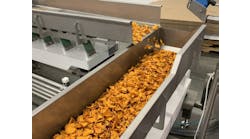While most of our focus this month has been on food plants, Archer Daniels Midland Co. has several construction projects in the works that are turning corn and other crops into alternative fuels … and, in the process, fueling debate about future shortages or price increases of agricultural commodities.
It's always been part food company and part ingredient company, but now ADM seems to be adding fuel company to its description, based on new plant construction plans for the next few years. It appears no coincidence that Patricia Woertz, who spent 30 years in the petroleum industry, was hired as CEO last April. And with the retirement of G. Allen Andreas, she also becomes chairman.
The Decatur, Ill.-based multinational is placing a big bet on ethanol and other biofuels as it ramps up its 2007 capital spending budget by about 47 percent (based on spending through six months of its fiscal 2007) to an estimated $1.12 billion. All of the estimated $358 million increase is planned for bioenergy projects, which will take more of the budget than food and infrastructure for the next three years -- that's a first.
While the agribusiness giant does have a cocoa plant under construction in Hazelton, Pa., its other projects are:
- An ethanol plant under construction in Columbus, Neb., and one in the permitting process in Cedar Rapids, Iowa.
- A biodiesel plant just coming on line in Mexico, Mo. (yes, that's a city in Missouri), and ones under construction in Velva, N.D., and Rondonopolis, Brazil. A biodiesel plant uses vegetable oil and methanol to make biodiesel and a co-product, glycerin. The biodiesel then is blended with petroleum-based diesel to make for a largely renewable fuel.
- Co-generation plants under construction in Clinton, Iowa, and Columbus, Neb. Cogeneration plants are permitted to burn a blend of fuels, including high- and low-sulfur coals, tire-derived fuel and biomass to produce process steam and electric energy. The addition of co-gen plants helps lower ADM's overall energy costs and lessens its vulnerability to energy market price fluctuations.
- Cogeneration reduces the amount of fuel burned per unit of energy output and reduces the corresponding emissions of pollutants and greenhouse gases, according to ADM spokespersons.
Although not fuel-related, other ADM construction projects also will turn agricultural products into industrial products that may find uses in food packaging. A polypropylene and ethylene glycol plant awaiting permits in Decatur, Ill. -- those materials eventually find their way into polyethylene terephthalate (PET) plastic bottles for soft drinks.
And a polyhydroxyalkanoates (PHA) plant is being built in Clinton, Iowa. PHAs are plastics chemically related to polyesters but borne of renewable, plant-based sources. They're close cousins to PLAs, polylactic acid, the compostable, corn-based plastic being developed for packaging use by NatureWorks LLC, a wholly owned business of Cargill Inc.
Through a strategic alliance with Metabolix Inc., ADM will manufacture PHAs using a patented process that converts corn-derived sugars into various PHA polymers. This is a natural biological process (as opposed to a chemical process) that uses sustainable, agriculturally produced raw materials.
In a recent presentation to financial analysts, ADM executives project ratcheting up capital spending again in 2008, with most of the increase again going to biofuel projects. Then it dips slightly in 2009 before returning in 2010 to approximately the $762 million spent in 2006. By that time, food and infrastructure projects will again take the majority of the capital spending budget.

